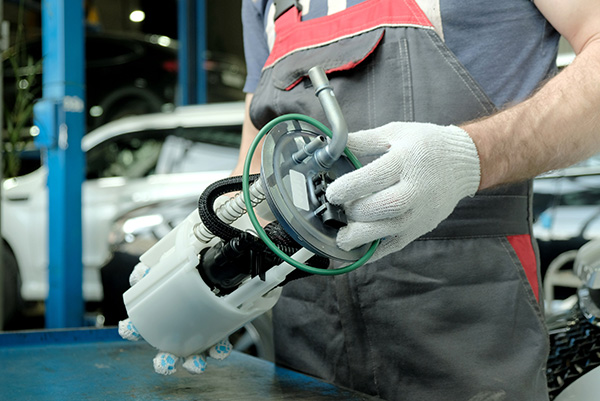
If your car isn’t getting enough fuel, you might notice it struggling to start, hesitating when you accelerate, or running rough at idle. Low fuel pressure can occur for several reasons, from a clogged fuel filter to a failing fuel pump. While it might start as a minor inconvenience, ignoring the issue can lead to serious performance problems—or even leave you stranded. Catching fuel system issues on time can help you avoid costly repairs and keep your car running reliably.
The Role of Fuel Pressure in Your Engine
Your engine relies on a precise mixture of air and fuel to operate. The fuel system—made up of the fuel pump, filter, injectors, and pressure regulator—ensures the right amount of fuel reaches the combustion chamber at the correct pressure. If the pressure drops too low, the engine doesn’t get enough fuel, causing misfires, power loss, and poor efficiency. In extreme cases, the vehicle may not start at all.
Common Causes of Low Fuel Pressure
Low fuel pressure can result from several mechanical or electrical issues within the fuel system. Some of the most common causes include:
Failing Fuel Pump
The fuel pump is responsible for sending fuel from the tank to the engine. If it starts to fail, it won’t be able to maintain the necessary pressure. Symptoms of a weak fuel pump include difficulty starting the engine, loss of power under acceleration, and sputtering at high speeds.
Clogged Fuel Filter
Over time, the fuel filter collects dirt and debris to keep contaminants from reaching the engine. A clogged filter can restrict fuel flow, causing a drop in pressure. If your car is struggling to accelerate or stalling unexpectedly, a dirty fuel filter may be the culprit.
Leaking or Damaged Fuel Lines
Cracks, leaks, or blockages in the fuel lines can prevent the system from maintaining adequate pressure. If you notice a strong gasoline smell or see fluid under your vehicle, it’s essential to have your fuel lines inspected immediately.
Malfunctioning Fuel Pressure Regulator
The fuel pressure regulator controls how much fuel reaches the engine. If it’s failing, it may allow too much or too little fuel to flow, leading to inconsistent performance. Common signs of a faulty regulator include black smoke from the exhaust, rough idling, and difficulty accelerating.
Dirty or Failing Fuel Injectors
Fuel injectors spray fuel into the engine in precise amounts. If they become clogged or malfunction, they may not deliver enough fuel, reducing pressure and affecting performance. Rough idling, misfires, and poor fuel economy are common indicators of injector problems.
How to Fix Low Fuel Pressure
If your car is showing signs of low fuel pressure, a proper diagnosis is the first step. Here’s how you can troubleshoot and fix the issue:
- Check for Fuel Leaks – Inspect the fuel lines and connections for any visible signs of leaks. If you detect a strong gasoline smell or see liquid under the car, have it repaired immediately.
- Test the Fuel Pump – A mechanic can use a fuel pressure gauge to determine if the pump is functioning properly. If the pump is weak or failing, replacement is necessary.
- Replace the Fuel Filter – If your filter is clogged, installing a new one can restore proper fuel flow and pressure.
- Inspect the Fuel Pressure Regulator – A failing regulator can be tested and replaced if necessary to restore balance to the fuel system.
- Clean or Replace Fuel Injectors – Clogged injectors can often be cleaned, but if they’re damaged, they may need to be replaced to ensure proper fuel delivery.
Prevent Future Fuel System Problems
Regular maintenance is the best way to avoid fuel pressure issues. Using high-quality fuel, replacing the fuel filter at recommended intervals, and keeping an eye on any performance changes can help keep your fuel system in top shape. If your check engine light comes on or your car starts struggling with acceleration, don’t ignore the warning signs.
NOLA Automotive Repairs
Low fuel pressure can lead to serious performance problems if left unchecked. If your vehicle is hesitating, stalling, or struggling to start, NOLA Automotive Repairs in New Orleans, LA, is here to help. Our expert technicians can diagnose and fix fuel system issues to get your car running at peak performance. Schedule your appointment today and drive with confidence!